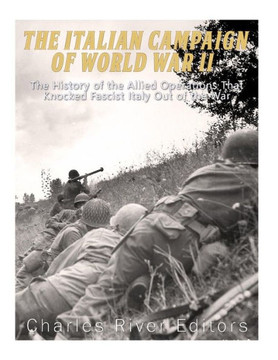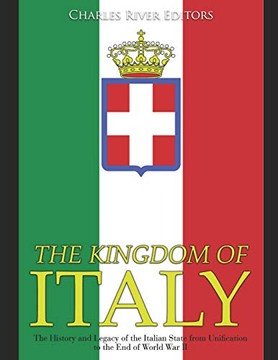
Independently Published
The Birth Of The Italian Republic : The History And Legacy Of The Allied Occupation Of Italy After World War Ii
Product Code:
9781696044592
ISBN13:
9781696044592
Condition:
New
$11.63

The Birth Of The Italian Republic : The History And Legacy Of The Allied Occupation Of Italy After World War Ii
$11.63
*Includes pictures *Includes a bibliography for further reading On March 25, 1957, Italy signed the Treaty of Rome, which established the European Economic Community (EEC), a forerunner of the European Union (EU) that was promoted as a guarantor of future peace in Europe. For the soldiers on both sides of World War II fighting each other 13 years earlier in the mountains around Monte Cassino, south of Rome, this would have seemed a highly improbable outcome. Despite British diplomatic efforts, Italy had joined the Axis in 1940 with the intention of expanding its African empire and reliving the glories of Ancient Rome. That proved to be a major mistake, and by the spring of 1943 Italy had lost all its African possessions. The Axis' North African defeat opened up the possibility of taking the war in the west to the European continent for the first time since France's lightning conquest by the Wehrmacht in 1940. The British and Americans debated the merits of landing in France directly in 1943, but they ultimately opted against it. The Soviets railed at the Westerners as "bastards of allies" - conveniently forgetting that they aided and abetted Hitler's violent expansionism in eastern Europe for over a year, starting in 1939 - but a 1943 "D-Day" style landing in France might have proven a strategic and logistical impossibility. Complex reasons lay behind England's successful insistence on the Mediterranean theater rather than the French theater as the scene of the next western Allied strike against Nazi Germany. Chief among these remained Britain's determination to keep a postwar empire, one that Churchill and his cabinet hoped would include Iraq and Iran, the source of oil needed to ensure that England continued to "rule the waves" with a powerful modern navy. This strategic imperative, indeed, formed the backbone of the British choice of Sicily as the target for military operations in the summer of 1943. Another major factor lay in Britain's deep (and, in the event, justified) distrust of the Soviets, and the perspicacious English assumption that the USSR would attempt to build a totalitarian empire in Eastern Europe following the war. Churchill and his generals hoped to engage in "peripheral warfare" with the Third Reich, defeating Germany in outlying territories until the Germans ousted Hitler and came to terms. The English leadership envisioned forming a quasi-alliance with the resultant German state to push the Soviets out of Eastern Europe and prevent an "Iron Curtain" scenario. The Italian Campaign of World War II effectively divided Italians into three groups, and the country into two rival political entities. In the absence of clear orders, the first group was the Italian troops who simply melted away, and the many civilians who just kept their heads down and tried to survive. Meanwhile, those still loyal to fascism established the Repubblica Sociale Italiana (Italian Social Republic, RSI) with a capital at Salo. Mussolini had been imprisoned after his deposition, but the Germans sprang for him in a daring special forces operation. He was reinstated as Duce in the RSI, but very much under German control. At the same time, the Allies set up Victor Emmanuel and Badoglio as leaders of the Regno del Sud (Kingdom of the South, RS) with the support of anti-fascist parties and armed resistance groups. That boundary slowly but inexorably moved northward as the Allied armies advanced, but the four main players in the contest for the post-war destiny of Italy had already been established; all of them heavily influenced by international ideologies. The fascists were loyal not only to the RSI but to Nazi Germany and wider fascist ideology. They were opposed by numerous mainstream parties of whom the Democrazia Cristiana (Christian Democrats, DC) quickly became the most important. These parties were loyal to a mixture of the liberal values of pre-fascist Italy.
| Author: Charles River Editors |
| Publisher: Independently Published |
| Publication Date: Sep 27, 2019 |
| Number of Pages: 128 pages |
| Language: English |
| Binding: Paperback |
| ISBN-10: 1696044596 |
| ISBN-13: 9781696044592 |





